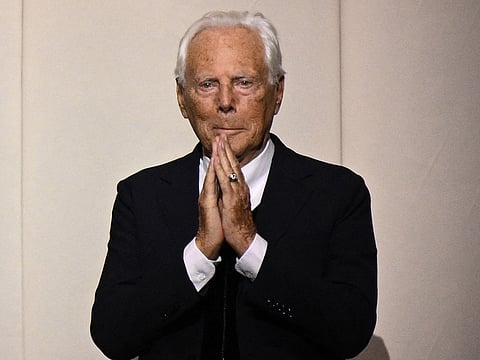Giorgio Armani's incredible Dubai legacy from Burj Khalifa Armani Hotel to luxury homes and fashion
The man who deconstructed the stiff, padded jacket of his father’s generation is no more

Dubai: Giorgio Armani, the Italian designer whose minimalist vision of elegance redefined global fashion for more than half a century, has died. He was 90. He was also a staple in Dubai's luxury landscape. Think of any plush space in the UAE like the iconic Hotel Armani at the Burj Khalifa and Armani's stamps are all over it.
Simply put, Armani was more than a brand; he was an idea.
He's the man who deconstructed the stiff, padded jacket of his father’s generation and gave the world fluid tailoring insisted that clothes should never “wear the wearer.”
His stripped-back aesthetic — navy, greys, blacks, neutrals — became synonymous with timeless refinement, whether on the red carpet, in boardrooms, or in everyday life.
A rebel with a vision
Born in Piacenza in 1934, Armani initially studied medicine before pivoting to design.
By 1975, he had launched his own label and within years was leading a revolution. His softly tailored jackets liberated men and women from rigid formality, marking a seismic shift in how the world dressed. “I felt that people should be able to look smart and feel comfortable at the same time,” he once said.
Hollywood helped seal his legend. Richard Gere’s wardrobe in American Gigolo turned Armani into a household name, catapulting his fluid suits into the global spotlight.
Soon, everyone from Jodie Foster to George Clooney, Cate Blanchett, Julia Roberts and Leonardo DiCaprio became ambassadors of his effortless chic.
Independent and uncompromising
Unlike many of his contemporaries, Armani never sold out to luxury conglomerates.
He remained the sole owner of his fashion empire, steering its direction with iron discipline and creative clarity.
“What drives me, and has always driven me, is the desire to create,” he told Gulf News in an exclusive interview in Dubai.
“In owning my own fashion house, I am at liberty to exercise my creativity in exactly the way that I choose.”
That independence allowed him to diversify without losing coherence. Hotels, furniture, restaurants, even chocolates — all bore the Armani imprint of understated elegance. Dubai became a cornerstone of this vision, with the Armani Hotel in the Burj Khalifa serving as a physical embodiment of his brand ethos.
“There was something so ambitious and so modern about the tower,” he said. “It seemed to symbolise the energy, vitality and vision of the city.”
Ahead of his time
Armani was often an early adopter — the first major designer to livestream his shows online in 2007, and one of the first to take a stand against ultra-thin models. He remained vocal about sustainability, weaving recycled and organic fabrics into his collections long before it was industry standard.
His shows were less about spectacle than subtlety. Evening gowns skimmed the body like whispers of tulle, while his menswear offered effortless nonchalance. “My design philosophy is based around the idea of timeless style, rather than the pursuit of passing trends,” he said.
The lasting legacy
Armani was the last of fashion’s titans still at the helm of his house — a designer who steered his empire with consistency and conviction. His clothes became shorthand for modern sophistication, his name a symbol of quiet power.
Reflecting on his life, Armani often credited his mother. “She used to say that if you wish to create beauty, only do what is necessary, and no more. That is a great lesson… by removing excess, you are left with something timeless.”
With Armani’s passing, fashion loses not just a designer, but a philosopher of elegance. His influence endures in every unstructured jacket, every cl
Sign up for the Daily Briefing
Get the latest news and updates straight to your inbox







